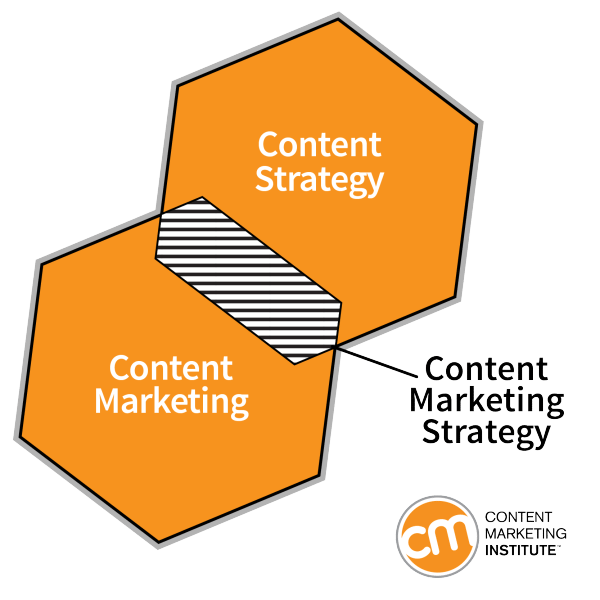Content Writing, Content Marketing, and Content Strategy
Print or digital, website or blog, newsletter or email, caption or banner, audio or video — whatever it contains is content and Content, they say, is King. Whether that is a truism or debatable is a different matter — and perhaps the subject of another blog.
(Image Courtesy: https://www.unravelkc.com/blog/content-marketing-vs-content-strategy-whats-the-difference/)
Now, here is a question about three aspects of content — strategy, production, and marketing:
Is a Content Strategist a Content Writer and/or a Content Marketing Strategist?
Someone who is great at marketing a brand may not be a good content strategist for it. Your COO may be a great content strategist, but may not be a good content writer. While one multi-tasker can fulfil all these roles, especially in smaller organisations, it would be simplistic to say that content strategy is the same as content marketing strategy — or that people who do both must be proficient in content writing as well.
First, what is Content? #
For the sake of clarity, I am going to define content as the text and images that are the tools you use to sell your idea/product within and outside your organisation. It is everything you employ to attract, engage and retain the attention of your audience.
What is Content Strategy? #
Broader in scope than content marketing, this term became popular in web development in the 1990s, and has acquired greater importance in recent years. It is the core planning, development, and management of content in written or any other media.
Content Strategy manages and covers all aspects of an organisation’s content output — creation, management, archiving, and iteration. It is concerned with the vision — the why of content generation, for whom it is generated, and how it will help them. It considers the organisation’s immediate and long term goals and how these will be achieved.
A smart content strategy measures, assesses and modifies content regularly. Forbes highlights its hallmarks.:
- It is measureable;
- leverages ideas across platforms;
- solves a problem and is a resource rather than an opinion;
- seeks to inform and so inspire trust — it is not a sales pitch;
- combines unique and curated content, and does not depend only upon newly-generated content.
What about Content Marketing? #
This is a strategy specific to marketing. It is the plan to achieve your marketing goals by creating, distributing and sharing content that engages audiences, generates leads, and improves branding for profitable outcomes. The goal of content marketing is to increase revenue, lower costs, and hook more/better customers.
The terms content strategy and content marketing are used rather loosely and interchangeably. There definitely is an overlap or intersection between the function and scope of each. Depending upon the goals and size of the organisation, your content strategist also serves time as your content marketing strategist and your content writer.
Let us take the hypothetical example of a clothing brand that has dismal sales and is looking to improve its bottom line.
Content strategy analyses the brand and the causes for its current low sales. Perhaps it is perceived as old fashioned, boring, and not youthful. Why is it perceived in these terms? Content strategy looks at all your content that your audience will encounter and suggests the ways and means — revamp your website, tell your story on specific social media platforms, use more videos, start a blog, advertise, etc. — to change this perception in order to boost ROI.
Content Marketing then executes this strategy across platforms with the goal of improving the bottom line. This is the actual engagement of telling your story on social media, writing a blog, create and promote ads, revamping a website and generally giving the brand a makeover.
Combining the two is content marketing strategy.
(Image courtesy: contentmarketinginstitute.com)
In these times of rapidly evolving technology, no organisation can survive without a digital presence that is accessible across the many devices we own. The way people purchase products and buy into ideas has changed; they are buying differently. Almost everything is available in the online marketplace today and studies show that customers — present and prospective — do 70% of their research online before they decide to buy offline.
An intelligent content strategy expands and builds brand loyalty. It looks at who the content is being created for, defines these personas, and addresses the questions they want answers for. As a content strategist, you have to give them a reason to listen to you and come back to you. On the other hand, the primary goal of a content marketing strategy is to sell the product/idea to the end-user.
Everyone in the organisation is responsible for content creation and marketing.
The way people buy today has evolved in a hugely different way than they used to even ten years ago. Therefore, selling and marketing have to be different; content has to be woven into your sales process too.
One of the biggest mistakes organisations make is over-compartmentalisation. Sales and marketing are not silos. Content and design are not silos. Only your marketers do not build brand equity; just your sales team does not make sales. Your designers, coders, and content specialists too play an important role in this effort.
Content strategy is an ongoing process and leverages information according to the platform on which it is featured. It is not about a quick sell. Each platform is unique, so it is not enough to generate some content, can it, and populate it across platforms. A successful strategy will strike a nice balance between the organisation’s business goals and the expectations of its target audience, its design and technological capabilities, and its content creation and editorial process.
Vaidehi Mehta is our very “propah” Content Strategist. She is a teacher and trainer with degrees in Economics, English and Education. Vaidehi spends her time at Influx curating and writing content and correcting everyone’s English.

